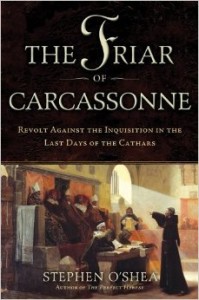File this book under: There is nothing new under the sun.
Also file this book under: Must read.
 Written by historian Stephen O’Shea, The Friar of Carcassonne: Revolt Against the Inquisition in the Last Days of the Cathars is a fascinating and thorough dive into church history at the turn of the 14th century in medieval France, a world entirely foreign to the modern world and yet entirely the same: the use of incarceration to control wealth & resistance, the conflict of power between church & state, the push-and-pull between formal & informal movements of the church (“religious vs. spiritual,” if you will).
Written by historian Stephen O’Shea, The Friar of Carcassonne: Revolt Against the Inquisition in the Last Days of the Cathars is a fascinating and thorough dive into church history at the turn of the 14th century in medieval France, a world entirely foreign to the modern world and yet entirely the same: the use of incarceration to control wealth & resistance, the conflict of power between church & state, the push-and-pull between formal & informal movements of the church (“religious vs. spiritual,” if you will).
At the center of the drama is the dynamic friar of the southern French city of Carcassonne: Brother Bernard Délicieux, a Franciscan of great oratory & political skill, who challenges the abuses of the Church’s inquisition against heretics — from the accusations against wealthier citizens (with the accused’s property brought under the auspices of Rome and the man’s wife & children evicted) to the practices of torture and imprisonment (including the charging of fees to prisoners for their own keep — a practice continued today).
Author O’Shea is skilled at bringing history to life without politicized sensationalism. He even warns the modern reader against attempting to draw direct parallels in critique (or praise!) of the Church and its abuses, cautioning that “the irrevocable chasm carved by the passage of time should always be kept in mind” (204). And so we should keep it in mind … but for intrigue and as an encouragement to read The Friar of Carcassonne, I’ll share a few passages that prompted me to shake my head & wonder if we will ever learn our lesson and provoked me to consider that Brother Bernard may have something to teach us:
“Bernard’s contemporaries asked plaintively where their Church had gone in this time of spiritual need. … People were told again and again to be afraid: of God, of Jesus, of Hell, of Purgatory, of the Church, of the inquisitors. Of strangers. Of neighbors. Of their own humanity” (176).
“The ‘formation of a persecuting society’ was a deliberate, conscious choice driven by social change and the entry of new actors into the arena of power” (39).
“To a culture of increasing persecution, of a developing Christianity of fear … to a culture intent on demonizing dissent and difference, [the friar of Carcassonne] said no. Brother Bernard saw violent persecution as incompatible with his religion” (133).
The Friar of Carcassonne is a fascinating and recommended read!

I will have to put it on my list. It sounds a bit like this one I read a number of years ago..https://www.bookdepository.com/Avignon-Marianne-Calmann/9780749004460